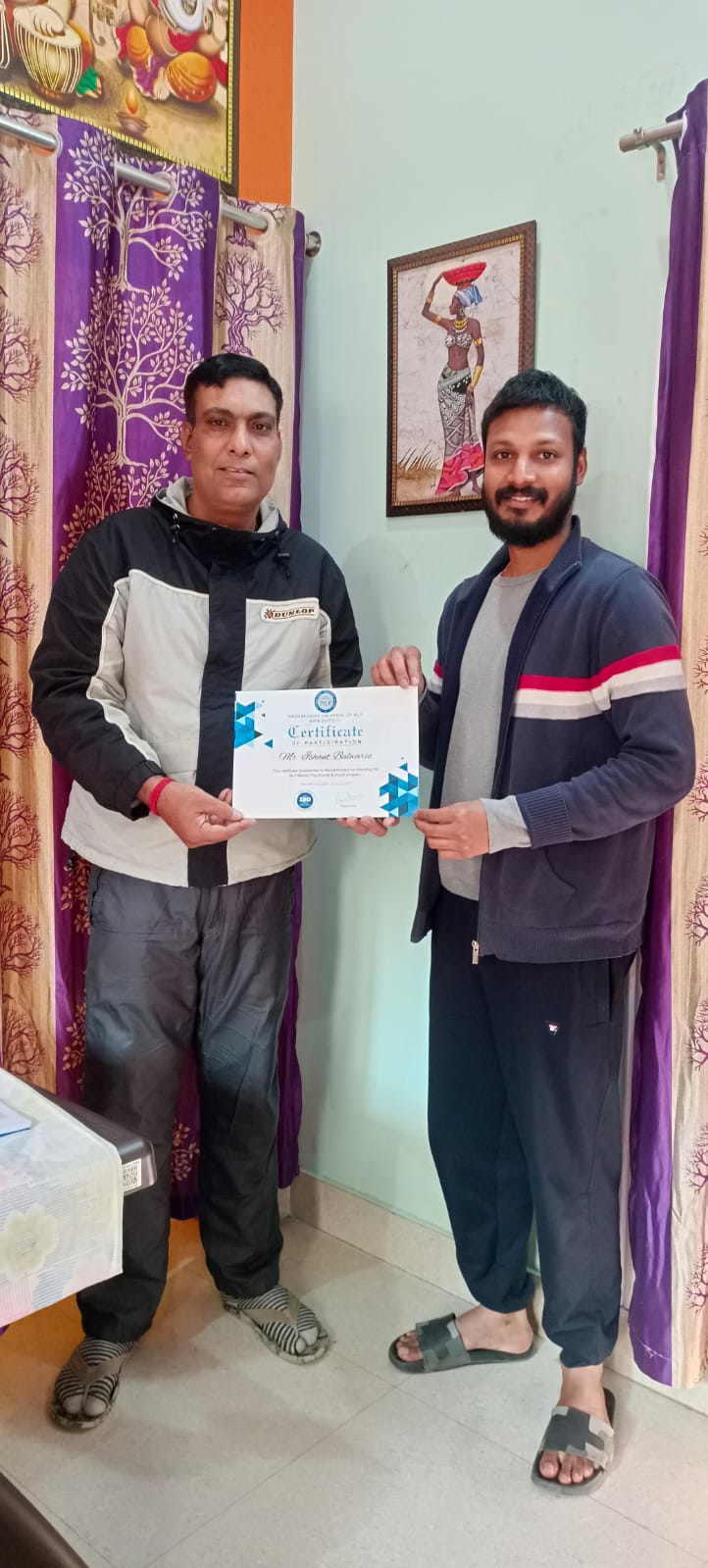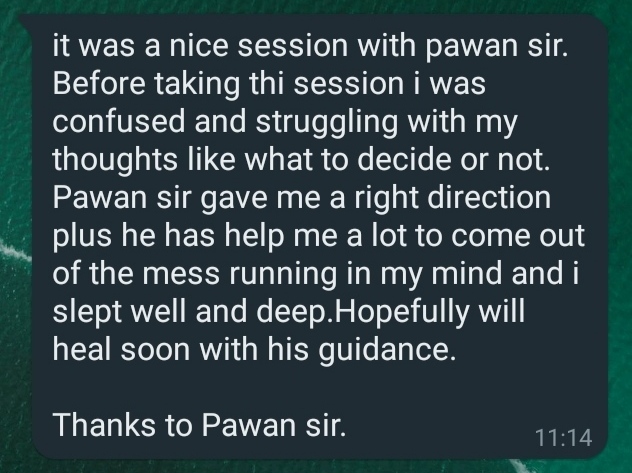



In life, lots of people know what to do, but very few people do what they know. Knowing is not enough! One must act; one must take a step forward or move in the direction one wishes to go with definite aim in mind. Our innovative approach helps bring clarity to your current situation while empowering you with the tools to move forward. Let it be the students, professionals, businessmen, housewife or any other person from any other walk of life. Failure, frustration, depression, illness, broken relationship, suicidal tendencies etc. have become very common. As a result, we see so much of human misery, not just in mentally ill people but also in the normal / healthy person. It is also seen that high functioning, relatively successful people are also unhappy. Quite often, pain and misery are unnecessary and finally end when people take charge of their beliefs, feelings and actions in order to modify the process of their lives. Empowering people to realize that they determine the outcome of their own lives is not always easy. In fact, it’s usually an overwhelming task. Our organization aims at giving you the means to make alterations in your own values, rules and controls that will allow your lives to become much more productive and fulfilling. Our effort would be to provide arsenal of tools for lasting change as well as lessons for enriching the quality of life.
FORGIVENESS FOUNDATION SOCIETY is a registered not for profit organisation committed to work for better mental health of people and addressing mental health needs of the community to make a healthier nation since its inception in year 2019. We are working relentlessly with a range of issues related to mental health. It is needless to say that holistic health is incomplete without mental health.
There is growing evidence that mental health issues have escalated deep into the society due to various reason. Not only in India, but the mental health issue is matter of grave concern across the globe also. The stigma associated with mental health issues and lack of awareness among people is one of the major reasons due to which larger portion dealing with them remains untouched. The stigma regarding mental health issues cannot be uprooted unless people will not accept the issues. We are gradually working towards positive direction day by day with help of your love, affection and generous support.
Through our Community Outreach Programs, we help create awareness about mental health in Schools, Colleges, Corporations, Clubs, Residential Societies, Other NGOs and Slum Clusters.
"Our organization aims at providing the means to alter self-values & rules to muscle emotional strength, making lives more productive and fulfilling."
WORKSHOPS, TALKS & DRIVES
We have conducted Workshops, Talks and Mental Health Awareness Desks & Drives in number of Schools, Colleges, Corporate and independently as well.
“Feel the feeling but don’t become the emotion. Witness it! Allow it! Release it!”
Every year, most of us go for physical checkups. Blood tests, urine tests… But why didn't we do the same for our brain? To be exact, our mental health?
Many of us think that mental illness is a sign of weakness. But mental illness, such as depression or anxiety can be as common as a fever! It can affect anyone, even those who are physically fit and healthy… To put it into statistics, every 1 in 3 persons are suffering from mental health issues… Our health is not just about body fats percentage or six packs shortcut…it is also about our minds too…
REASONS… WHY MENTAL HEALTH MATTERS?
There is no health without mental health! The world health organisation defines health as a state of complete physical, mental and social well-being and not merely the absence of disease or infirmity.
According to National Crime Record Bureau (NCRB): In 2019 total 1,39,123 people commit suicide in India. In which 14,019 were unemployed, which is higher than 8.37 percent than 2018. People commit suicide in 2019 have 10.1 percent ratio of unemployed. In 2018 total 12,936 unemployed people commit suicide in India.
According to World Health Organisation (WHO): In India, almost 23 Lakh people needs immediate attention for their mental health attention. Suicidal rates in youth is higher in the country. Depression takes 9 percent of Indian towards disability.
According to National Mental Health Survey 2015-2016: Around 7.5 percent Indian are suffering from any of mental disease, while 1 in 20 Indian is depressed. Because of stigma in society, more than 80 percent mental health patient didn’t get treatment. Around 15 Crore Indian need to see a doctor or a mental health professional at immediate basis for their mental health challenges.
Mental health is vital to individuals, families and societies! Mental health is a state of well-being in which the individual realizes his or her own abilities, can cope with the normal stresses of life, can work productively and fruitfully, and is able to make a contribution to his or her community.
Mental health is determined by socioeconomic and environmental factors! Mental health and mental illnesses are determined by multiple and interacting social, psychological and biological factors, just as health and illness in general.
Mental health information and awareness must increase! Having an information and awareness about mental illness can help those people experiencing it feel that they are not alone on their way to recovery.
This can make the society more informed and accepting about mental illness.
RISING OF DEPRESSION, A MAJOR CONCERN IN INDIA.
Responsible Factors:
1: Stigma and Cultural Factors: The widespread stigma attached to mental health is a crucial factor in India’s lack of concern for depression. Mental health difficulties are frequently viewed as a sign of weakness or even as being possessed by evil spirits by deeply ingrained cultural beliefs.
2: Lack of Infrastructure: India has a critical scarcity of facilities and specialist who work in the field of mental health. Since there is only one psychiatrist for every 343,000 people, many people still lack access to mental health services.
3: Social and economic influences: The complexity of India’s socioeconomic structure considerably increases the burden of depression. Major obstacles to mental health include rapid urbanization, income disparity, unemployment, and financial pressures.
4: Lack of Education and Awareness: The dearth of thorough mental health instruction in schools and universities contributes to India’s ongoing ignorance of depression. Alarmingly low level of mental health literacy in the general community make it difficult for people to comprehend and empathize with persons who are experiencing mental health problems.
5: Gender Disparity: The difficulties women have with their mental health are frequently made worse by India’s patriarchal society. Higher rates of depression among women are attributed to marital violence, gender-based discrimination, and having less control over one’s life choices.
Based on reports, we observed that India's youth has one of the highest suicide rates in the World, and hence we felt encouraged towards organizing an impactful initiative that promotes the mental well-being of young people in India. Therefore, to fulfill our objective we have organized "Youth Empowering Programs on Mental Health". The theme of this program is “FORGIVENESS”, – Forgiveness is an integral part of our holistic healthcare, every disease and illness is a result of dissatisfaction of any act by others or by self. This program offers a Solution oriented Panel Discussion, engaging Individual Talks and some Psychological Activities.
“You are not responsible for the programming you received in childhood.
As an adult, you are 100% responsible for fixing it!”
- Dr. Pawan Sharma "The Psychedelic"
According to surveys and studies by mental health professionals in India, it’s more common for women to be abandoned if diagnosed with a mental health illness. Fear of social stigma means that we tend to hide any issue of Indian women’s mental health until it’s too late.
According to a 2016 report by National Commission for Women, families that willingly abandoned their mentally ill women members most often do so because of huge associated social stigma. Indian women are at the verge of mental health crisis like never before and respite, care and space.
A new report claims that more than 20,000 housewives took their lives in India 2014. This was the year when 5,650 farmers killed themselves in the country.
Unipolar depression, predicted to be the second major cause of global disability by 2020, is two times as common in women. It is well-known fact that an estimated 80% of people affected by violent conflicts, civil wars, disasters, and displacement are mostly women and children. India is no different and in addition to these socio-economic and natural factors around two-thirds of married women in India were victim of domestic violence.
Depression disorder cause 41.9% of disability among women compared to 29.3% among men. Even among the elderly those suffering from depression and dementia are mostly women.
Our trained experts help such women and girls to get rid of these trauma and phobias by psychological exercises and counselling.
“Forget your past, Forgive yourself, and begin again right now!”
FORGIVENESS FOUNDATION SOCIETY is working in prisons and addressing the psychological needs and problems of the inmates. We have observed from our interventions that inmates require a continued and sustainable psychological first aid services to cope up with aggression, remorse and guilt anxiety, depression and other negative emotions and psychoactive substance use. Majority of these issues can be handled by basic counseling, psychotherapy, teaching stress management and relaxation techniques. Further it is also observed that few inmates need proper assessment of psychopathology and referral services for treatment of acute cases of anxiety depression and poor impulse control. This will help in reducing the incidence and prevalence of violence, interpersonal relationship issues among inmates and create an enabling environment for improving quality of life and reduction in the chances of repeating the offences. These interventions have also been found helpful in improving the inmates and correctional staff relationship. It will be a new approach to mental health care in prisons where in modal of assessment of psychological problems and intervention will be developed.
“Until you heal the wounds of your past, you are going to bleed. You can bandage the bleeding with food, with alcohol, with drugs, with sex; But eventually, it will all ooze through and stain of your life. You must find the strength to open the wounds, stick your hands inside, pull out the core of the pain that is holding you in your past, the memories and make peace with them. Hate in your heart will only damage your soul!”
(SUICIDE PREVENTION COUNSELLINGS AND COACHING PROGRAM)
FORGIVENESS FOUNDATION SOCIETY aimed at changing the major structural and attitudinal barriers to achieve positive mental health outcomes in populations. We observed that there is a significant increase in number of suicides in recently. We are proud to say that with the help of our counselling we remove suicidal tendency of some young people who were suffering from different traumas i.e. rape, eve-teasing, domestic violence, PTSD (Post Traumatic Stress Disorder) and other abusive incidents.
As per NCRB data, at least 15 suicides take place every hour in India, which means over 1.30 lakhs people ending their lives in a year. Number of suicide attempts is ten times higher than the total suicide deaths, which means about 14 lakhs people attempt suicide in India every year. Under IPC Section 309, attempt to suicide was a criminal offense in India and the punishment included imprisonment up to one year or fine, or both.
Repealed Section 309 IPC
"Whoever attempts to commit suicide and does any act towards the commission of such offence, shall be punished with simple imprisonment for a term which may extend to one year or with fine, or with both."
Amendment
"Notwithstanding anything contained in section 309 of the Indian Penal Code, any person who attempts to commit suicide shall be presumed, unless proved otherwise, to have severe stress and shall not be tried and punished under the said Code."
“Never be a prisoner of your past. It was just a lesson, not a life sentence! Time heals all wounds, but forgiveness will heal all time!!”
________________________________________________________________________________________________________________________________________
The Ministry of Education issued draft guidelines to sensitize and provide support for cases of self-harm in students in schools all over India. The plan is the need of the hour, after an alarming number of students died by suicide in 2023. Under the guidelines drafted, a School Wellness Team will be set up that will follow the protocols. The School Wellness Team (SWT) will detect and report early warning signs of affected students. The comprehensive suicide action plan will be implemented, and necessary steps will be taken accordingly. The guidelines which are released by the Union Ministry of Education, will be followed by schools as a step towards Suicide prevention and awareness of mental health in educational settings in India.
UMMEED which stands for Understand, Motivate, Manage, Empathise, Empower, Develop is a step-by-step action plan that emphasizes the values of emotional intelligence. Being aware, managing and regulating our own and others’ emotions, and empathizing with others.
Every school will have a School Wellness Team (SWT) set up by the school Principal, who will be responsible for handling crisis situations. This team will include counselors, teachers, representatives of school management and medical team, and peer monitors, and will be led by the school Principal. The wellness team will take immediate action upon receiving reports of any student displaying the warning signs.
The plan calls for an immediate response to at-risk children who are displaying the warning signs, also to those who are actively taking steps towards harming themselves.
In addition to that, enhancing awareness, encouraging peer support, and organizing daily activities that help with relaxation and reducing stress would build a great toolbox to help with students’ mental well-being in school. Additionally, there will be more vigilance at river banks, bridges, cliffs, medical shops and river banks for prevention, according to the guidelines.
The core of the guidelines is based on the fundamental idea that ‘Every Child Matters’, guiding the creation for preventing student suicides. As a strategy to help prevent suicide and the stigma associated with suicidal behavior, the plan highlights the importance of fostering communication and partnership among schools, peers, and the community. Lighting up dark corridors, and maintaining clean spaces around the school helps facilitate a secure and healthy environment for children. The plan also calls for removing negative behaviors in classrooms like comparison with peers, perception of failure as permanent, measurement of success based on academic performance, and passing sensitive comments on physical appearances. Positive psychological and physical environment in schools will help children’s mental and physical wellbeing.
This comprehensive suicide action plan is an intervention that includes crisis response protocols and counseling services. The plan’s purpose includes implementing mental health education programs to raise more awareness about signs of depression, anxiety and suicidal ideation among parents, children, and teachers, and to prevent the stigma that still pertains to seeking help for mental health concerns.
Guidelines noted school, school-going students undergo a lot of transitions that may cause extreme stress, like transitions from school to college, shifting cities or countries due to a parent’s transferable job, or losing a parent, or a dear one. Children may also experience physical and developmental changes in appearance that lead to concerns of self-consciousness, academic pressure, and more. Whilst going through the changes, a sensitive comment may affect their self-esteem. A supportive and mental health-sensitive environment in school is now necessary.
_________________________________________________________________________________________________________________________________________
What is Mental Wellness?
Mental wellness is more than the absence of mental illness; it includes:
* Positive state of mental health, * Feeling happy, * Ability to cope with the normal stressors of life, * Working productively and fruitfully, * Realising own achievements and abilities, * Making contributions to the community.
What is Mental Illness?
Mental Illness can affect our emotional, psychological, and social well-being. It affects how we think, feel, act, handle stress, related to others, and make choices. Mental illness can occur at any stage of life, from childhood to adulthood through adolescence.
Myth and Facts about Mental Health Issues:
Myth: Mental health problems don’t affect me.
Fact: Mental health problems are actually very common.
# 1 in 5 adults experience a mental health issue
# 1 in 10 young people experience a period of major depression
# 1 in 25 live with a serious mental illness, such as schizophrenia, bipolar disorder, major depression
# India’s annual suicide rate is 10.5 per 100,000, while for the world as a whole it is 11,6.
Myth: Children don’t experience mental problems.
Fact: Even young children may show early signs of mental health concerns.
# Half of all mental health disorders show first signs before the age of 14.
# Three quarters of mental health disorders begin before the age of 24.
Myth: People with mental health needs can’t hold a job.
Fact: They can be just as productive as other employees.
When employees with mental health problems receive effective treatment, it can result in:
# Lower medical costs
# Increased productivity
# Lower absenteeism
# Decreased disability costs
Myth: There is no hope for people with mental health problems. They never recover.
Fact: People with mental health problems can get better and many recover completely.
Myth: I can do anything for a person with a mental health problem.
Fact: Loved ones can make a big difference. Friends and family can help someone get the treatment and services by:
# Reaching out for help and letting them know you are available for help
# Help them access mental health services
# Learning and sharing the facts about mental health
# Treating them with respect
# Refusing to define them by their diagnosis or using labels such as “crazy”, “mad” etc.
Myth: Having mental illness means you are “crazy”, “mad” etc.
Fact: You are human and susceptible to illness, the same as any other person.
Myth: People with mental illness are violable and dangerous.
Fact: Majority of people with mental illness are not violent. The unfortunate truth is that they are more likely to be victims of violence.
Myth: People with bipolar disorder are moody.
Fact: Bipolar disorder does not cause mood swings. It causes cycles that last for weeks or months. These extreme highs and lows take turns; and do not change from moment to moment.
Myth: Post-Traumatic Stress Disorder (PTSD) is only a military men’s disease.
Fact: Anyone can have PTSD. A rape or sexual assault victim, a domestic abuse victim, a survivor of natural disaster, someone who has suffered a loss or even a person who witness someone having mental health problems.
Myth: Seeking help for mental illness will lead to being defamed and make symptoms worse.
Fact: It’s hard to come out to anyone about having mental illness, because they’re misunderstood. People think that they are the way they are, because of nature, personality or attitude.
When you are open up to someone, you are working to reduce stigma, increase awareness, empower yourself, grow as a person, and promote understanding of mental health.
Why Seek help?
Seeking help is a positive step, it enhances health, well-being and happiness. Seeking help, regardless of the problem being faced, is sign of strength and courage.
When to seek help?
When you find the following signs in yourself or in a loved one:
# Sleep or appetite changes, # Decline in personal care, # Rapid mood changes, # Feeling of disconnection from oneself or surroundings
# Withdrawal from normal activities and unusual drop in daily functioning, # Problem in concentration, memory, logical thought or speech
# Loss of initiative or desire to participate in any activity, # Illogical thinking or exaggerated beliefs, # Fear or suspicion of others
# Unusual, odd or uncharacteristic behaviour
Points to remember: -
Mental Health problems/ Illnesses are:
# Preventable by adopting healthy lifestyle and identifying early signs
# Mostly Treatable like other illness
# Manageable with psychotherapy, medicines and family support.
My experience of the program was very empowering in a way that, now I am more aware of the human behaviour. Now, it is different that I approach them in more positive ways. I can even help myself of getting rid of bad habits.
Thank you Dr. Pawan Sharma Sir.

It was a nice session with Pawan Sir. Before taking this session I was confused and struggling with my thoughts like what to decide or not. Pawan Sir give me a right direction plus he has help me a lot to come out of the mess running in my mind and I slept well and deep. Hopefully will heal soon with his guidance.
It was a nice guidance by Dr Pawan sir. took 3 session with and I finally have right approach towards to take decision in my life. It was a great help.
Thanks to Pawan Sir.

I am very much tanhful to Dr. Pawan Sir. It was a wonderful experience with him. I was earlier suffered with OCD and had some bad and harmful thoughts frequently. With the treatment by Pawan sir, now I am enjoying a healthy life and healthy relationship woth my family, friends and my child. I am highly recommed his expert gudence to everyone having any kind of mental issues challanges. Thank you.
"I’m humbled and grateful to Dr. Pawan Sharma Sir. He is always help me to clear my doubts when I am puzzled and stressed. His counselling and valuable suggestions means lots for me to take right decision. So once again thank you so much."
its great for people to come out from this condition and live their lives fully. I can only imagine the feeling of gratitude it provides for you people who are giving their precious time and putting all the efforts without any monetory gain in others recovery. I am making steady progress, panic attacks stopped and I am now connecting with the environment surrounding me. I am sure slow and ateady I will get there.
Earlier I have an identity of a diabitic patient, after getting counselling session with Dr. Pawan Sharma, I got my new identity of a healthy person and it really works. Now I feel more healthy and active than early. My sugar rating is also gone lower side. He listen all my problems and issues and provide very easy to apply solutions for them. I am very happy feeling good to meet him and his team. May God bless them all. Thank you.
I met Dr. Pawan sir and find he is amazing to solve any problem. Today I am so glad to spend time with him. He is a very impressive person and dedicated towards mankind. His team members are also very amazing paople and with a friendly attitude. They are serving to society with a pure heart. In future, I will be looking to join Forgiveness Foundation Society to serve the nation.
Very few people in this world, who can think out of the box.. He's (Dr. Pawan Sharma) one of those platinum hearts, who always think of others' situation and not only thinks but also did a fabulous job to overcome... You will always be my top prior inspiration.. Thank you.

"I’m really thankful to Dr. Pawan Sharma who politely listened to my problems, he thoroughly analysed what are my issues and how do I react to circumstances. I really needed help to overcome through my breakup and pain. But it isn’t hard anymore. He gave me simple examples of my own life to get over the pain and overthinking. Those were real logics which I had to apply in my situation. But it’s not late, because of Mr. Pawan now I know how to handle such situations. I’m happy to say it didn’t take me so long to come out of the depression."
"I was wondering how Pawan Sir did this miracle to me. I was couldn't qualified my CA Final examination. All of my friends were passed out and I felt so disappointed. I was so depressed and worried about myself. There was no ray of hope and I was thinking of ending my life. Then I come to know about Pawan Sir, I met him without any expectations. And after meeting with him, I was revived and charged to take that challenge again.i attempted examination and successfully completed my Chartered Accountant Degree. Now I am living a happy and successful life with my family and friends. Thank you so much Pawan sir for making my life meaningful and enjoyable."